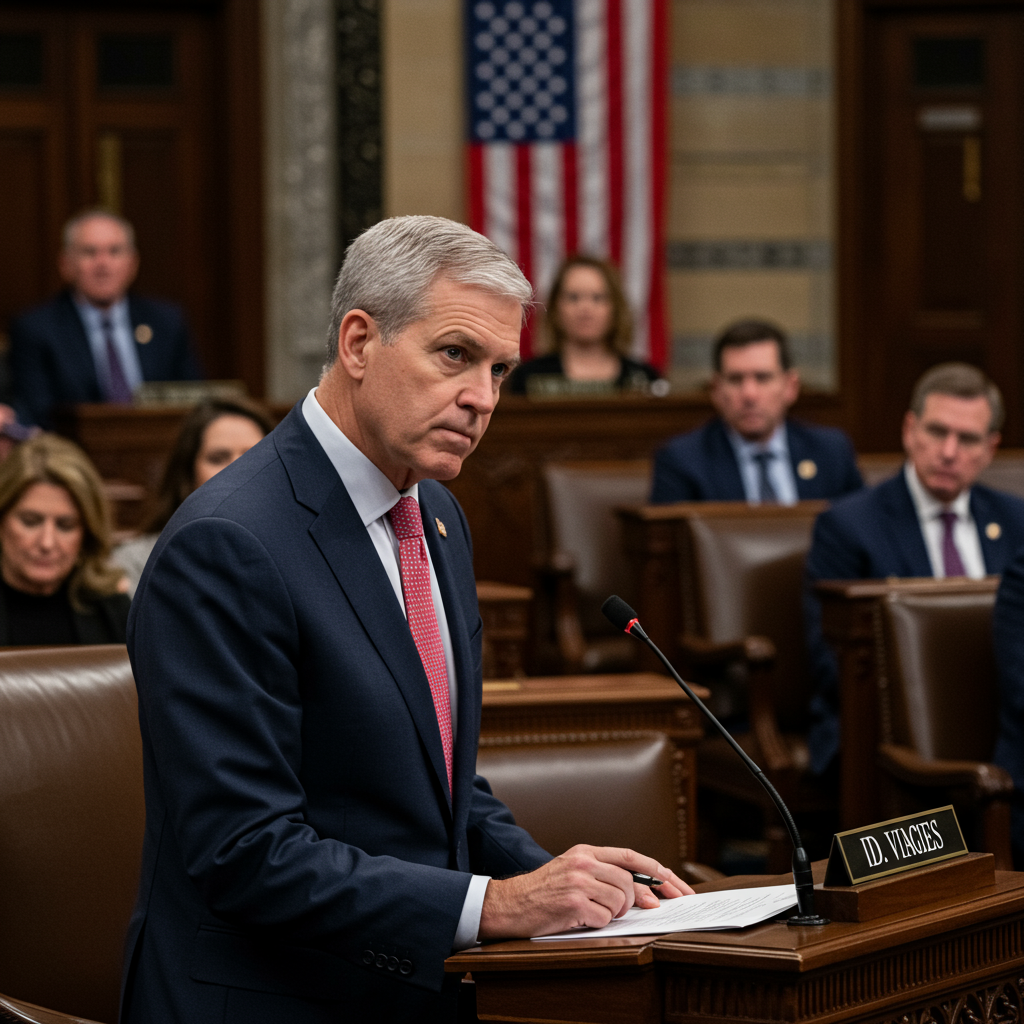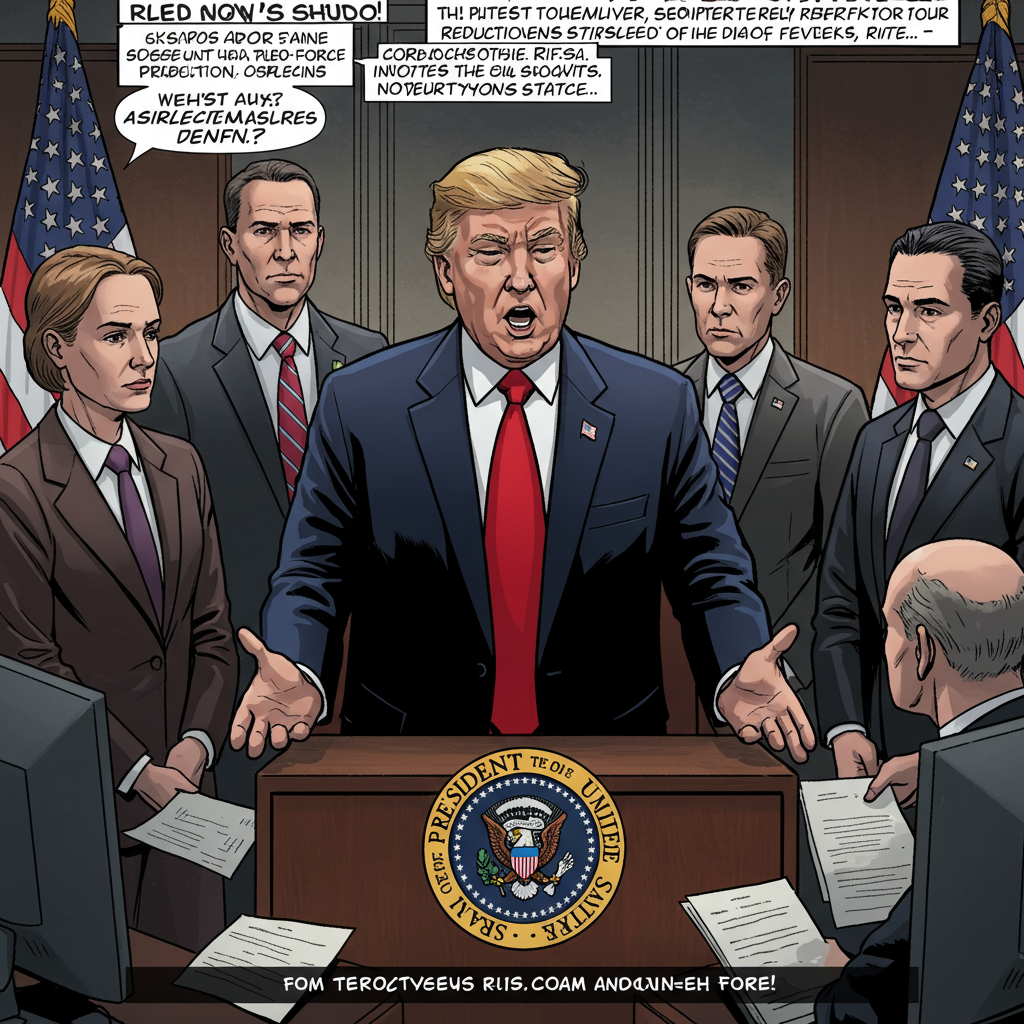A pivotal vote looms in the U.S. senate today, Saturday, June 28, 2025, as Republicans grapple with passing a massive tax and spending package, often dubbed the “megabill.” With critical support uncertain among key senators, the procedural vote scheduled for this afternoon hangs in the balance, potentially requiring Vice President JD Vance to cast a tie-breaking vote. This high-stakes legislative maneuver reveals deep divisions within the Republican party over key policy changes and the overall direction of President Donald Trump’s ambitious domestic agenda. The outcome of this initial vote will determine if the sweeping legislation can even move forward to debate and potential passage.
High Stakes for a Critical Senate Vote
The Republican leadership in the Senate is pushing towards an initial vote later today on the latest version of President Trump’s significant tax and spending proposal. This comprehensive Senate megabill incorporates numerous aspects of the administration’s priorities. However, last-minute changes made overnight might not have garnered sufficient support to ensure smooth passage, even within the Republican caucus, let alone appealing to conservatives in the House of Representatives. The tension is palpable at the U.S. Capitol as senators huddle and strategize ahead of the anticipated vote.
Navigating the Procedural Hurdle
Advancing the bill requires clearing a crucial procedural vote. This vote isn’t on final passage itself, but rather a motion to proceed to debate. If this motion fails, the megabill essentially stalls before it can even be fully discussed or amended on the floor. Senate rules dictate that this motion typically needs a simple majority to pass. In a closely divided Senate, the defection of even a few senators can jeopardize the outcome and necessitate bringing in the Vice President.
Senate Republicans are acutely aware of this possibility. Many believe Vice President JD Vance should remain close to the Capitol, ready to step in if a 50-50 tie occurs. Senator Markwayne Mullin (R-Okla.) openly acknowledged the uncertainty, stating, “We won’t bring it to the floor if we don’t have the votes… I think it’d be better to have the vice president close. I don’t know if we’re going to need him.” This sentiment underscores the fragile state of support for the legislation.
Key Republicans Signal Opposition
The path forward for the Senate megabill vote is far from guaranteed, primarily due to concerns voiced by several Republican senators. While some, like Senators Josh Hawley (R-Mo.) and Susan Collins (R-Maine), provided a boost earlier Saturday by agreeing to vote for opening debate, their positions on final passage differ.
Senator Thom Tillis (R-N.C.) remains a firm opponent. On Saturday, he reaffirmed his commitment to voting against both the procedural motion and the final passage. Tillis, considered one of the most vulnerable Senate Republicans facing re-election in 2026, has significant reservations, particularly regarding the bill’s proposed cuts to Medicaid totaling hundreds of billions of dollars. Despite a personal outreach from President Trump himself to sway his vote, Tillis appears unmoved, according to sources familiar with the private discussions.
Senator Collins indicated she is “leaning against” supporting the bill for final passage without substantial revisions. Although she plans to vote to proceed to debate, this doesn’t guarantee her ultimate backing. She intends to propose numerous amendments during the “vote-a-rama” phase, focusing on issues like Medicaid funding and top income tax rates.
The Risk of a Tie-Breaker Vote
If at least two other Republican senators join Senator Tillis in opposing the procedural vote this afternoon, the Senate leadership would need to rely on Vice President Vance’s constitutional authority to break a 50-50 tie to advance the bill to debate. Several other Republican senators have raised concerns that could potentially lead them to vote against moving forward. Senators Rand Paul (R-Ky.), Ron Johnson (R-Wis.), Mike Lee (R-Utah), and Tim Sheehy (R-Mont.) are among those mentioned as having reservations.
Senators Johnson and Rick Scott (R-Fla.) reportedly met with President Trump shortly before the scheduled vote, driven by their concerns about the bill’s potential impact on the national debt. This eleventh-hour meeting highlights the administration’s efforts to shore up support and address the anxieties within the party regarding fiscal responsibility and policy specifics.
Deep Divisions Over Policy
The primary hurdles for the Senate megabill vote stem from fundamental disagreements over key policy provisions embedded within the legislation. These divisions span critical areas like healthcare, taxation, and federal spending, creating a challenging landscape for Republican unity.
The Medicaid Battleground
Perhaps the most contentious issue is the proposed reduction in Medicaid spending. Critics within the Republican party argue these cuts disproportionately affect working-class families and vulnerable populations. Senator Hawley, despite agreeing to vote for final passage, has been vocal in his opposition to the Medicaid cuts, stating, “I think, frankly, my party needs to do some soul searching. If you want to be a working-class party, you’ve got to deliver for working-class people. You cannot take away health care from working people.” He plans to work to dismantle these cuts even if the bill becomes law. Senator Collins has also consistently warned against the proposed Medicaid reductions and plans to offer amendments to address this during the debate phase. The staunch opposition from senators like Tillis is directly linked to these healthcare provisions.
Tax and Spending Concerns
Beyond healthcare, other policy areas are generating friction. The treatment of the state and local tax (SALT) deduction has been a significant point of contention, particularly among Republicans representing higher-tax states. While House leaders appeared to have reached a compromise on the latest version of the SALT deduction language in the Senate bill, gaining support from figures like Rep. Mike Lawler (R-N.Y.) and key blue-state Republicans, other fiscal issues persist. Senators like Ron Johnson and Rick Scott have focused on the bill’s overall effect on the national debt, leading to direct consultations with the President. Additionally, specific provisions related to programs like SNAP (food assistance) are still under review, with senators like Dan Sullivan (R-Alaska) examining potential changes and local impacts, while praising other specific carve-outs like an increased deduction for whale hunters as a win for his state.
House Dynamics Add Complexity
The challenges facing the Senate megabill vote are compounded by resistance brewing in the House of Representatives. Even if the bill clears the Senate, it must pass the House, where similar policy disagreements exist. More than a dozen House Republican lawmakers, including Rep. David Valadao (R-Calif.), have threatened to vote against the legislation if the Medicaid provisions are not brought closer in line with the version previously passed by the House. These members have voiced their concerns directly to party leadership, who reportedly held a call this afternoon to address the internal discord, urging members to keep disagreements private rather than airing them on social media. This indicates that even if the Senate can forge a path forward, the legislative battle is far from over.
What Comes Next if the Vote Succeeds?
Should the procedural vote succeed this Saturday afternoon, the Senate would then move into a period of debate on the megabill. This debate phase precedes what is known as “vote-a-rama.” This is a marathon session where senators can offer an unlimited number of amendments to the bill. This process allows senators with specific concerns, like Senator Collins with her focus on Medicaid and tax rates, to attempt to alter the legislation. Only after the conclusion of vote-a-rama and the consideration of all amendments is a final vote on the bill’s ultimate passage possible. The duration and outcome of vote-a-rama could significantly reshape the bill and influence whether senators like Collins ultimately decide to support it.
President Trump Pushes for Passage
Adding to the pressure, President Trump has explicitly thrown his support behind the revamped Senate measure. The White House issued a statement of administration policy emphasizing the President’s desire to see the bill on his desk by the July 4th holiday. The statement framed failure to pass the bill as the “ultimate betrayal” of his campaign promises, highlighting the importance of this legislation to his legacy and political platform. This firm backing from the executive branch puts immense pressure on Republican lawmakers to overcome their internal differences and unite behind the bill.
Frequently Asked Questions
What is the significance of the Senate’s Saturday vote on the megabill?
The vote scheduled for Saturday, June 28, 2025, is a crucial procedural step to determine if the U.S. Senate can begin formal debate on a major tax and spending package. This initial motion to proceed requires a simple majority. If it fails, the bill cannot advance to the next stages, effectively halting President Trump’s significant legislative priority. The vote is highly uncertain, indicating deep divisions within the Republican party.
Why might Vice President JD Vance be needed for the megabill vote?
Vice President JD Vance may be required to cast a tie-breaking vote if the procedural motion to advance the megabill results in a 50-50 split in the Senate. This scenario becomes possible if at least two Republican senators join Senator Thom Tillis in opposing the motion, creating a deadlock. The Vice President, in their constitutional role as President of the Senate, can vote to break ties on legislative matters.
What policy disagreements are causing Republican senators to oppose the megabill?
The primary policy disagreement causing Republican senators to oppose the megabill centers on proposed cuts to Medicaid funding. Senators like Thom Tillis, Susan Collins, and Josh Hawley have voiced strong concerns or outright opposition to these healthcare reductions. Other points of contention include the bill’s impact on the national debt (raised by Senators Ron Johnson and Rick Scott) and provisions related to programs like SNAP, although issues surrounding the SALT deduction seem to have been partially resolved.
Conclusion
As Saturday afternoon progresses, the eyes of Washington remain fixed on the U.S. Senate. The fate of President Trump’s expansive megabill hangs precariously on a procedural vote, facing significant opposition from within the Republican ranks. Divisions over critical policy issues like Medicaid cuts and the national debt have created a dramatic legislative standoff. The potential need for Vice President JD Vance to break a tie underscores the razor-thin margin separating the bill from either moving forward to a grueling debate and amendment process or stalling indefinitely. The outcome of this vote will not only shape major areas of tax and spending policy but also reveal the current state of unity and power dynamics within the Republican party heading into future elections.



